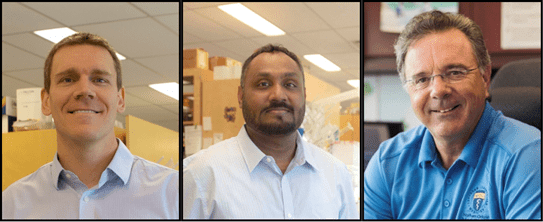May 5-10 is Safety and Health Week, and we’re highlighting Canadian Cancer Society-funded researchers’ efforts to help make workplaces safer.
Radon, diesel fumes, night shift schedules and hazardous substances in dentistry are just some of the workplace hazards that may influence a person’s risk of cancer – but they aren’t fully understood.
In 2021, recognizing that workplace cancer research receives less than 1% of cancer research funding in Canada, CCS collaborated with 14 workers’ compensation boards and labour unions to establish the Workplace Cancer Research Fund and partnered with the CIHR Institute of Cancer Research to prevent cancer cases among workers.
Here, we catch up with 4 of the fund's recipients.
Reducing radon-relate lung cancer risk
Radon gas, a natural radioactive substance found in the ground and building materials, builds up in poorly ventilated areas. Inhaling radon in homes and workplaces is a significant cause of lung cancer in Canada.
“Radon has been cited by Health Canada and other organizations as the second leading cause of lung cancer after smoking,” says Dr Christopher Thome, from the Northern Ontario School of Medicine.
Dr Thome and his team are studying a dietary supplement that may protect against radon-related lung cancer. He is using a first-of-its-kind radon chamber to test the supplement’s ability to reduce lung cancer risk.
“If we can find an effective, low-cost strategy using this dietary supplement, it could be employed by industry to ensure workers’ safety,” concludes Dr Thome.

Cancer risk in night shift workers
Nighttime work has been linked to a higher risk of cancer. There are almost 2 million people in Canada working between midnight and 5 a.m. That’s why Dr Parveen Bhatti, from the BC Cancer Research Institute, is studying how night shifts affect cancer risk.
“Night shift work is here to stay,” says Dr Bhatti. “We need to come up with strategies to protect the long-term health of night shift workers.”
Dr Bhatti is working to collect data from a wide range of industries to find out how night work affects workers’ gut microbes. Microbes in our digestive system help keep us healthy. They play a role in digestion and in how we fight diseases. Changes in sleeping habits might disrupt their balance, which could lead to health problems, including an increased risk of cancer. Understanding these changes may help us better prevent cancer in night shift workers.

Preventing cancer in people exposed to diesel fumes
Breathing in exhaust from diesel engines may increase the risk of prostate cancer, but research on this topic is limited. Dr Marie-Élise Parent, from the Institut national de la recherche scientifique, is examining the work histories of more than 8,000 people to understand how diesel fumes affect prostate cancer risk.
“Uncovering the modifiable causes of prostate cancer has proven to be a real challenge,” says Dr Parent. “We want to clarify whether people exposed to diesel engine exhaust in the workplace have higher risks of prostate cancer.”
Her research combines data from three large studies conducted in Canada, France and Spain. The findings could help prevent cancer for nearly 1 million people in Canada exposed to diesel fumes at work.

Reducing dental workers' cancer risk
Dental professionals may use many hazardous substances in their work. Right now, there are no records of these exposures. This represents a potential risk for over 100,000 workers in Canada.
“Dentistry is a rapidly evolving medical field,” says Dr Sabrina Gravel, from the Institut de recherche Robert-Sauvé en santé et en sécurité du travail. “New materials are often tested for their safety towards patients, but not towards the workers who use them.”
Dr Gravel is studying dental workers’ health and safety practices and tracking cancer-causing substances in dental clinics and laboratories.
“This project is important because it’s going to fill a knowledge gap about occupational exposures to carcinogens in dentistry,” she says.
The first phase of the research, which consists of an online survey for dental workers, will be deployed this summer. The information gathered will help create practical guides with steps, strategies and recommendations for dental workplaces in Canada.

